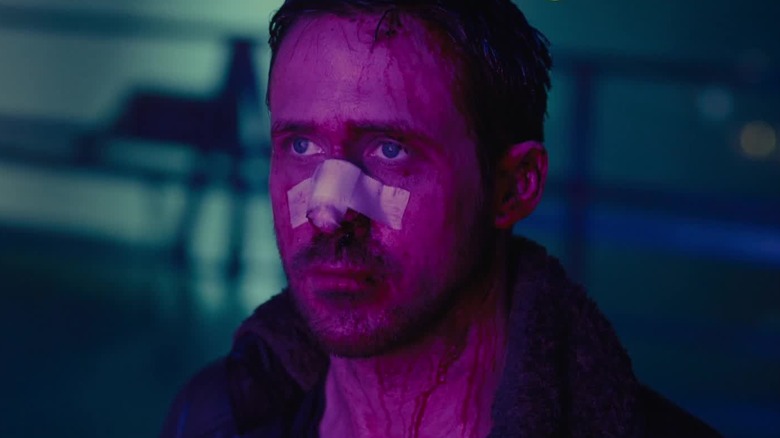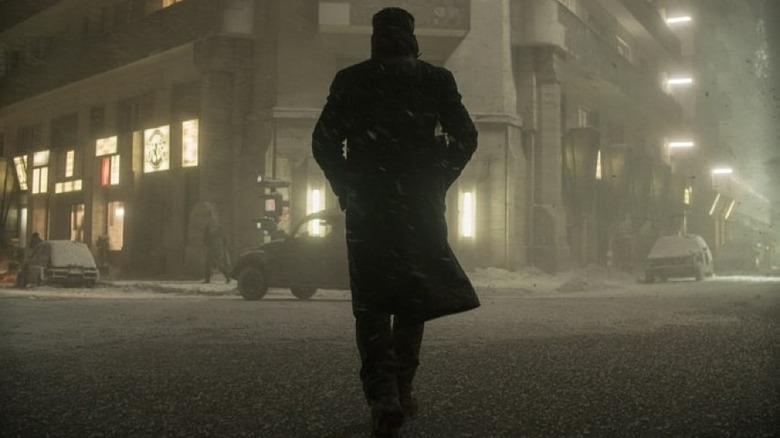Tales From The Box Office: How Blade Runner 2049 Became A Cautionary Tale
(Welcome to Tales from the Box Office, our column that examines box office miracles, disasters, and everything in between, as well as what we can learn from them.)
It is no secret that Hollywood loves a franchise play in the modern age. The success of the Marvel Cinematic Universe, "Star Wars," "Harry Potter," and "Transformers," among many others, has forced studios to try and do whatever they can to get a leg-up on the competition with recognizable IP that can generate several sequels, if not a whole universe. Sometimes this works out unexpectedly well, such as with "The Conjuring" universe. Other times? Not so much.
In this case, we are going to look at "Blade Runner 2049," a movie that is, by most accounts, a sci-fi masterpiece, but that was doomed (financially speaking) seemingly from the outset for various reasons. With "Dune" now hitting theaters, we figured now would be a good time to look back at director Denis Villeneuve's first attempt at bringing a beloved '80s franchise back to life for modern audiences.
The Movie: Blade Runner 2049
When Ridley Scott's "Blade Runner," based on the works of beloved author Philip K. Dick, was released in 1982, it was nothing short of a flop. To date, it has made just $39 million, which is not what a studio wants — not even in the '80s — from an ambitious sci-fi flick starring Harrison Ford, especially from the guy who directed "Alien." To make matters more complicated, the original theatrical version is by no means the definitive version, with "Blade Runner: The Final Cut" finally making its way to release years later. The original cut featured narration by Ford's character Deckard, which was eventually removed, as one example of a major change that would be made over the years. It was a mess.
All of this to say, as much as time has been kind to "Blade Runner," it was not a hit in its day. It was always a heady sci-fi play, not at all a crowd-pleaser like "Star Wars," or even the better of the "Star Trek" movies. It never screamed big-budget franchise — and it never should have. Be that as it may, the gears of Hollywood move in such a way that a sequel was eventually explored, originally with Scott set to return as the director.
Things truly got cooking when Alcon Entertainment scooped up the rights to the franchise, with the intent to make a sequel. In 2011, it was announced that Scott would direct the follow-up, and years of development followed. Eventually, commitments to "Alien: Covenant" prevented Scott from sticking to the director's chair, though he did remain on board as an executive producer. Enter Denis Villeneuve, who was coming hot off of acclaimed hits "Prisoners" and "Sicario." Ryan Gosling later boarded in the lead role, marking his first role in a major franchise. But the big get was Harrison Ford signing on to reprise his role as Deckard, especially coming off of "Star Wars: The Force Awakens," which remains one of the biggest movies of all time. All of the pieces were in place for anyone who might want a "Blade Runner" sequel. The problem is, that audience, relative to the sizable number of moviegoers it takes to make a blockbuster a hit, was limited.
The Financial Journey
After years of development and a long production process, "Blade Runner 2049" officially hit theaters on October 6, 2017. Critics wrote rave reviews, the trailers boasted gorgeous visuals, and the movie came with a star-studded cast. It had an awful lot going for it on paper. Unfortunately, it just wasn't enough to cover what was spent to bring this sci-fi vision to life.
The biggest problem is that "Blade Runner 2049," a nearly three-hour-long sequel to a thinking man's cult sci-fi movie, ended up with a production budget estimated to be between $150 and $185 million. That's more or less what it costs to make a Marvel movie, which is as close to a sure thing as the modern moviegoing marketplace has to offer. Estimates suggested that the movie needed to make around $400 million at the global box office to break even. It didn't even get close to that mark, and it was hard to expect that this kind of movie ever would, when looking at it from the average moviegoer's perspective. Could a long, atmospheric sci-fi flick based on a nearly 40-year-old movie such as this really be expected to make "War for the Planet of the Apes" ($490 million) money? In hindsight, that was a tall order.
The film opened to a rough $32.7 million domestically, and that pretty much set the tone for the run at the box office that would unfold in the following weeks. In the end, "Blade Runner 2049" earned just $92 million domestically after spending 119 days in theaters. Internationally, it took in $167.1 million, making for a grand total of $259.2 million. Honestly, it's pretty amazing that a "Blade Runner" sequel made that much money, if we're able to divorce the raw number from the budget. Unfortunately, the movie business being what it is, it's impossible to divorce those things.
The Lessons Contained Within
There are some harsh, harsh lessons to be learned from what was attempted with "Blade Runner 2049." The unique thing about movies is that they are an intersection of art and entertainment that is generally dependent on commerce. There is no disputing that this movie is widely considered to be a modern sci-fi masterpiece, a worthy sequel to the original, and an excellent example of what makes Villeneuve a modern master of his craft. But, at some point, the realities of the business must come into play, and it was arguably irresponsible to make this movie for that amount of money. There are no two ways about it. Even Ridley Scott said he would have cut 30 minutes from the brutal 2 hour and 44-minute runtime.
While Warner Bros. lost money as the distributor and partner on the deal, they are a major studio. They can handle a loss, brutal though it may be. Alcon Entertainment, on the other hand, was a smaller company making a big play. That is where the real shame comes in here, as the financial fallout hit them much harder. Ultimately, the losses piled up, resulting in a hefty round of layoffs at the company. This goes beyond a simple analysis of numbers, as people lost their jobs and livelihood over this movie. There are consequences — very real ones — for making such misguided decisions in the hopes of getting in on the franchise game in Hollywood.
Where Does This Leave Dune?
Despite the fact that Villeneuve expressed concern that this movie might derail his career, the filmmaker is too good to be kept on the sidelines and now has a new franchise on his back in the form of "Dune," also produced by Warner Bros. Are there similarities? Absolutely. The work of a beloved sci-fi author previously adapted in the '80s getting a second shot in the 2010s in an attempt to make a blockbuster franchise. It's all there. But "Dune," as the early numbers suggest, has enough for more general moviegoers to grab onto. Giant sandworms, lots of action, a "Lord of the Rings" meets "Star Wars" vibe in the marketing. Despite the similarities (not to mention risk) associated with "Dune," the differences appear to make it a bit more of a calculated risk.
It is easy to understand that certain film fans want more from blockbuster entertainment, the type of more that "Blade Runner 2049" offered us. Sometimes people take an analysis of the business as a shot at the movie, and that couldn't be further from the case. It's important to understand why certain things get made and why others don't. At the end of the day, it's a business, even if art is the engine that drives it. I want to see studios take big swings such as this just as much as I want to see my two or three Marvel movies per year. I just want to see them done in a responsible enough manner that gives them a fighting chance in the marketplace, rather than doomed from the outset.




